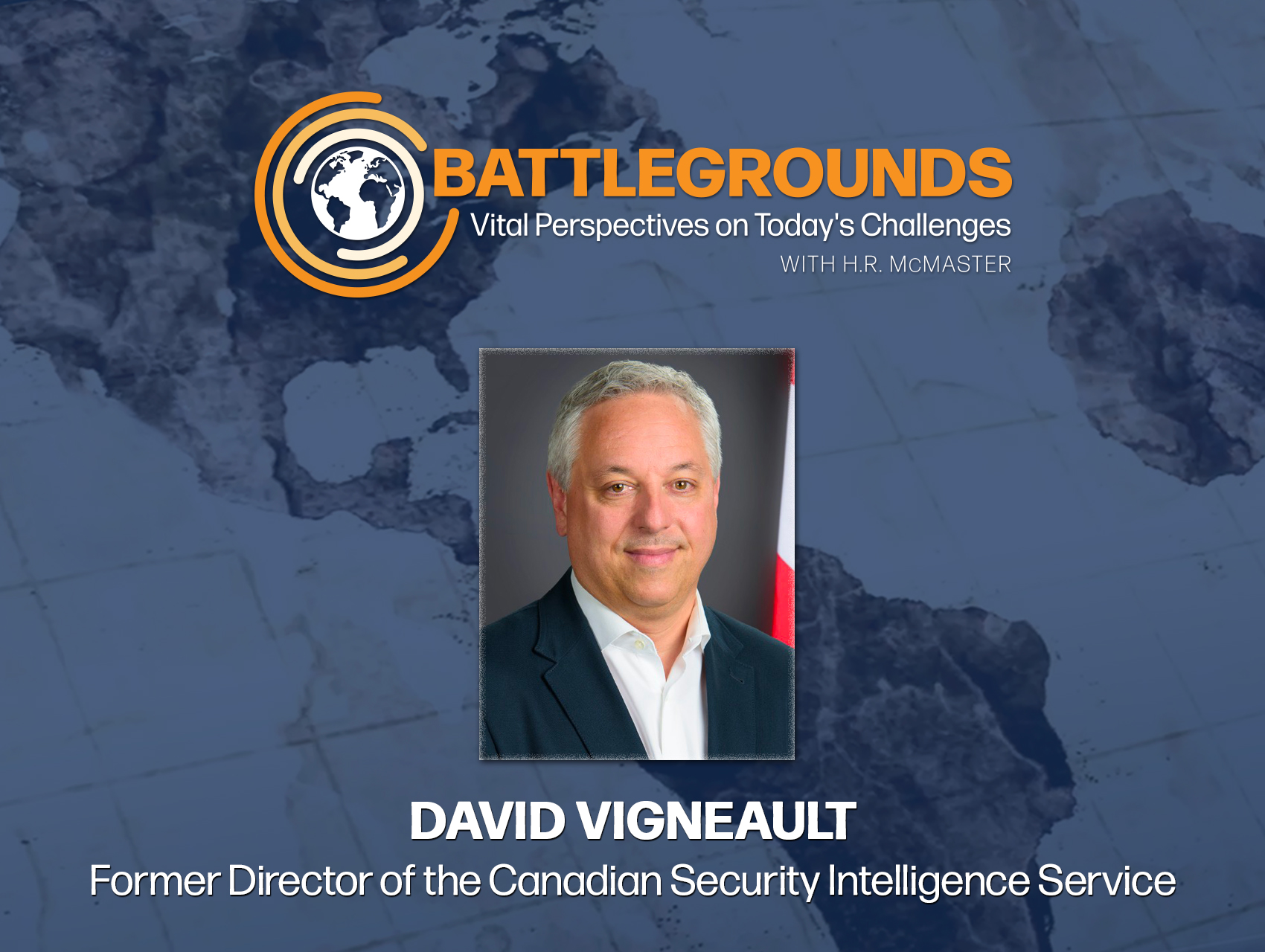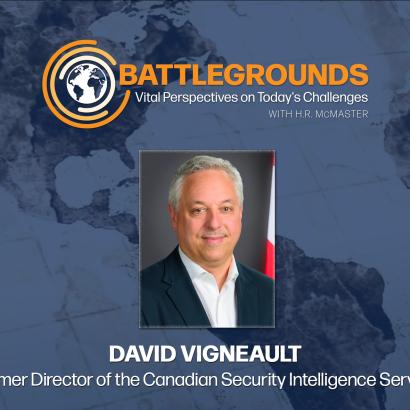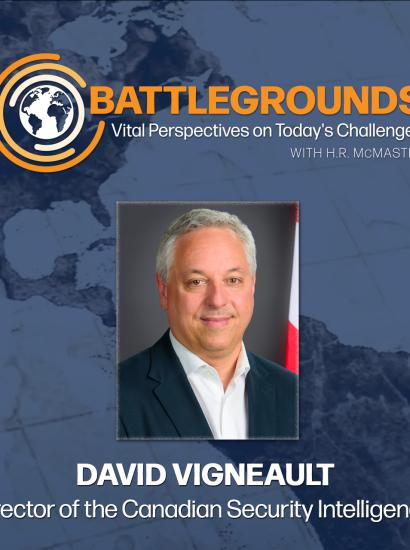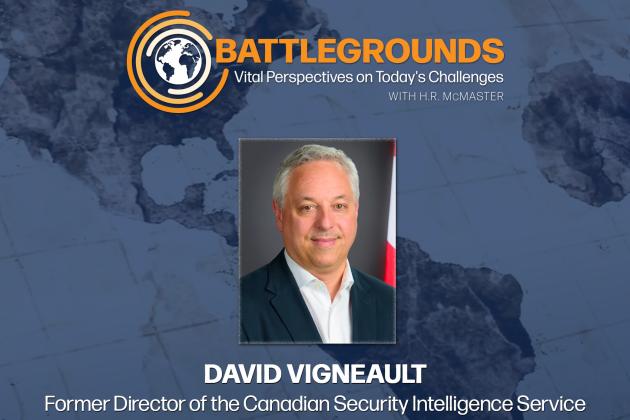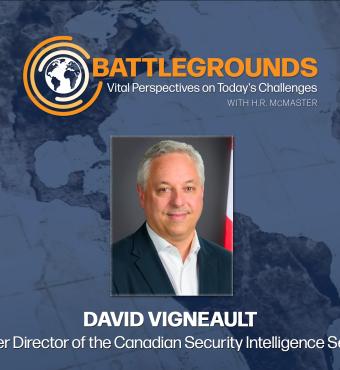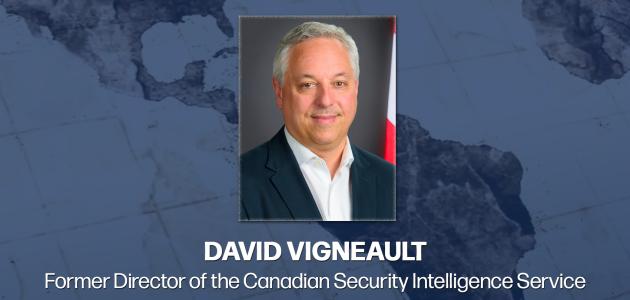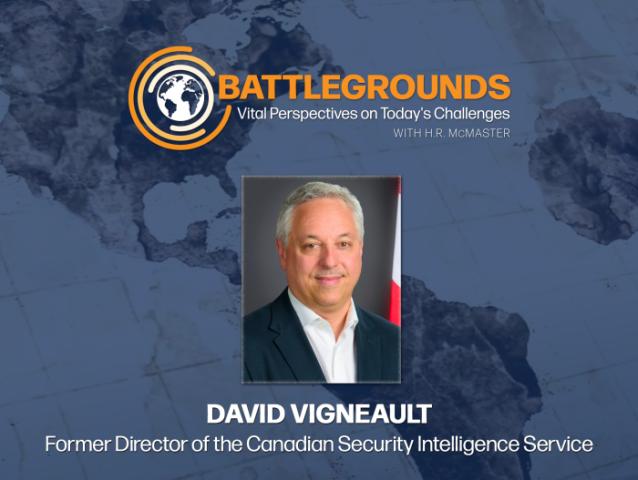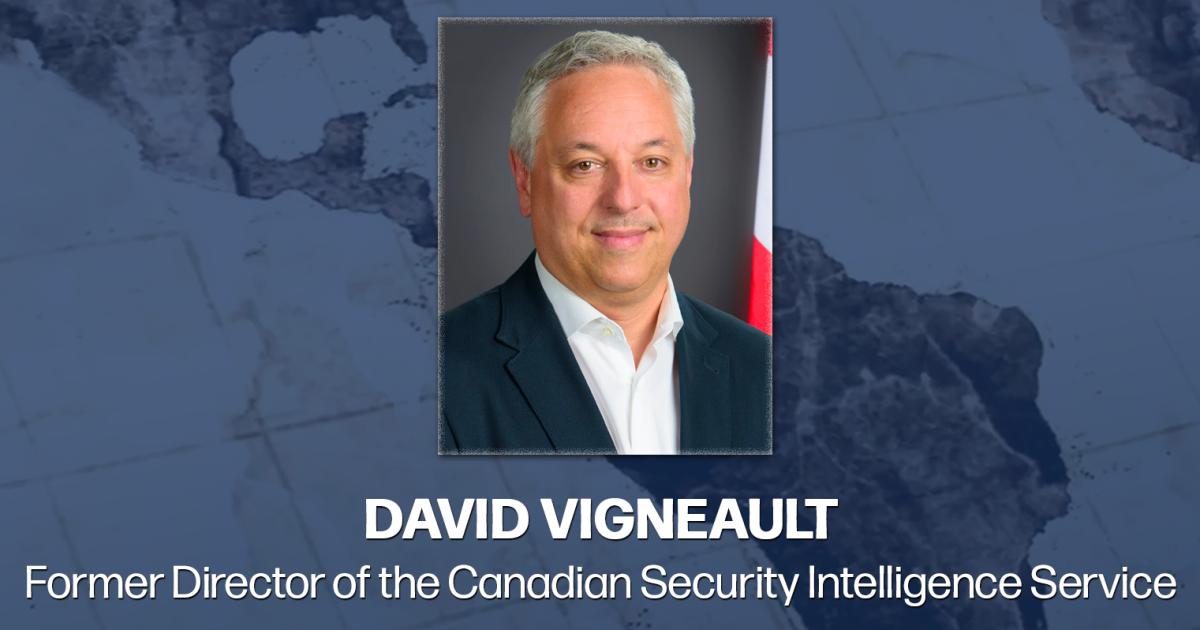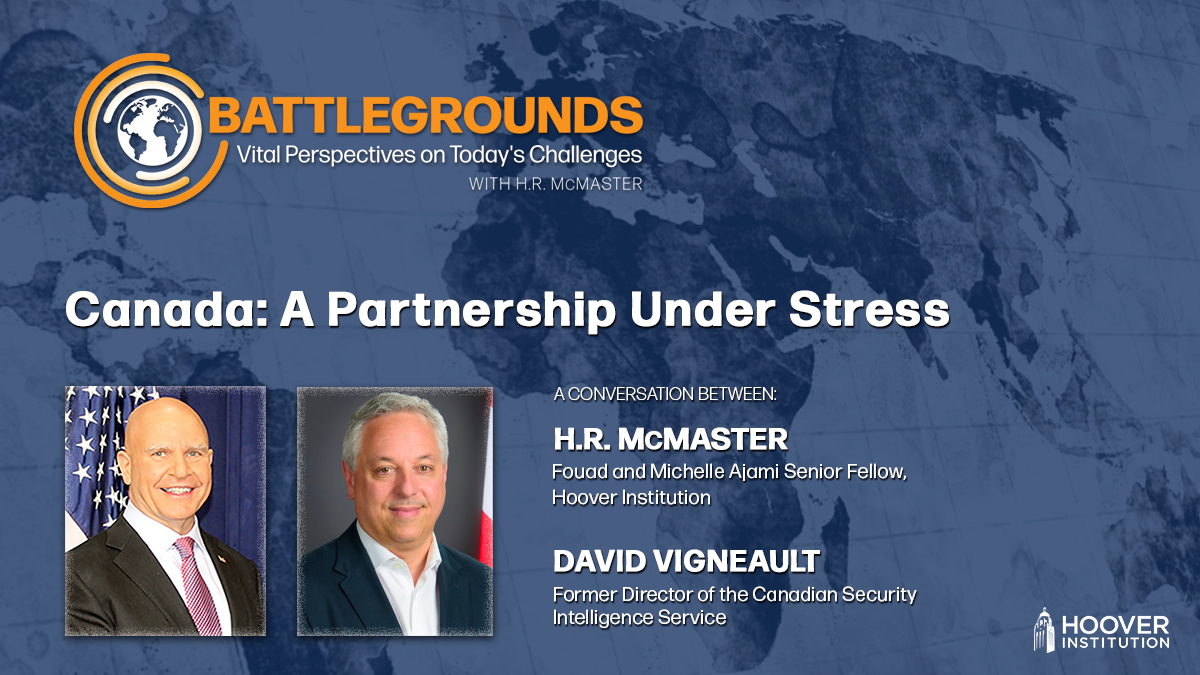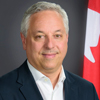
- Determining America's Role in the World
Join former director of the Canadian Security Intelligence Service, David Vigneault, and Hoover Senior Fellow, H.R. McMaster, as they discuss the Canadian federal election results, trade, and the potential for a common agenda for the future of the US-Canada alliance. Reflecting on Prime Minister Mark Carney’s victory in the Canadian federal election in April 2025 and President Trump’s recent controversial comments on Canada as the ‘51st state’, Vigneault provides his thoughts on the importance of the US-Canada relationship and outlines a positive agenda of cooperation between both countries in areas including North American defense, intelligence cooperation, missile defense, supply chain resilience and energy security. Vigneault discusses Canada’s relationship with Mexico, the dangers associated with conflicts in South Asia, including the current conflict between Pakistan and India, and how best to secure critical infrastructure, sensitive technologies, and intellectual property from hostile countries such as China.
Recorded on May 2, 2025.
WATCH THE VIDEO
>> HR McMaster: America and other free and open societies face crucial challenges and opportunities abroad that affect security and prosperity at home. This is a series of conversations with guests who bring deep understanding of today's battlegrounds and creative ideas about how to compete, overcome challenges, capitalize on opportunities, and secure a better Future.
I am HR McMaster. This is Battlegrounds.
>> Presenter: On today's episode of Battlegrounds, our focus is on Canada. Our guest is David Vigneault, the former Director of the Canadian Security Intelligence Service, also known as CSIS. Under his leadership, CSIS elevated awareness of vulnerabilities in sectors critical to Canadian innovation and sovereignty, ranging from biopharmaceuticals and artificial intelligence to aerospace and quantum computing.
Prior to csis, Vigneault served as Assistant Secretary to the Cabinet for Security and Intelligence in the Privy Council Office. He also held roles in the Canadian Border Services Agency, the Communications Security Establishment, and the Department of national defense. In August 2024, Vigneault joined Strider Technologies, a US based strategic intelligence firm where he guides security strategy across public and private sector domains.
Canada, the second largest country in the world by area, was inhabited for millennia by its Indigenous peoples who developed distinct languages, cultures and governance systems. Norse seafarers reached the eastern coast in the 10th century and French and British explorers followed in the 16th century and competed for territory and influence.
In 1608, Samuel de Champlain founded Quebec City and established alliances with Indigenous nations. After Britain's victory in the Seven Years War in 1763, it seized control of French Canadian holdings. In 1867, Canadian leaders passed the British North America act, which instituted a system of political autonomy for the Dominion of Canada.
Canada gained international recognition for its military contributions in both world wars and achieved full legal sovereignty by adopting its own Constitution in 1982. Canada and the United States share one of the world's most extensive bilateral relationships. The two nations are bound by geography, trade, and deep security cooperation.
Members of the North American Treaty Organization, the United States and Canada jointly operate the North American Aerospace Defence Command, share intelligence through the Five Eyes alliance, and serve together in NATO. In 2024, the two nations, along with Finland, launched the Icebreaker collaboration effort as part of an increased focus on Arctic security.
The United States and Canada are top trade partners and share over $700 billion in bilateral trade each year. Under the second Trump administration, insults and trade actions initiated in Washington generated economic and political tensions with Ottawa. On February 1, 2025, President Trump instituted a 25% tariff on Canadian imports.
Over the following months, the US and Canada went back and forth, adjusting and postponing various levels of retaliatory tariffs. President Trump said that the United States does not need anything from Canada, called for it to become the 51st state, and called it a nasty negotiator. After Trump announced the tariffs on Canadian cars and parts in March 2025, Canadian Prime Minister Mark Carney said that the US was no longer a reliable partner.
We welcome Mr. Vigneault to discuss the Canadian federal election results, trade and the potential for a common agenda for the future of the U S Canada Alliance.
>> HR McMaster: David Vigneault, welcome to Battlegrounds. Great to be with you again. And gosh, there's a lot to talk about about the U.S. canada relationship.
And I can't think of a better person to have on Battlegrounds to explain the importance of that relationship and the prospects for the future to our viewers. Thanks for joining us.
>> David Vigneault: Well, HR It's a privilege. It's great to see you on the screen. And you're absolutely right.
This is a momentous time and we want to make sure that, you know, we have, we share as much of our wisdom or the little that we have with people because the world is in need of a bit of wisdom. And grounding, well, the situation as we might call it, between U.S. Canada relations.
>> HR McMaster: I mean, I just couldn't believe it, David. I mean, really Canada, we're gonna have problems with Canada. But before we get into the, you know, the various insults about 51st state and the trade actions that are threatening, I think, prosperity on both sides of the border, I wonder if we could just first set the scene with your perspective on the importance of this amazing relationship between the closest of allies by proximity and I would say also by aligned interests and, you know, everything, including North American defense.
But maybe, you know, we've heard your background, but maybe how you've grown your understanding of the importance of the relationship, what it means to you.
>> David Vigneault: Absolutely. I've had the privilege in charge to work for the federal government in. In many different iteration of responsibilities related to national security and defense and intelligence.
And you cannot work in the federal government, Canadian, federal government in these sectors without having a very direct and deep relationship with our American partners. Would it be with the Pentagon, with the armed services, the intelligence services, the border. So ICE and cbp, Every organization that in the US Administration there's a collary in the Canadian system where the people, so the people to people ties in these administration, but also the institution themselves and the governance that has been put in place to essentially manage this amazing relationship that exists between Canada and the U.S. complex one, of course, as a Canadian.
I push for Canada's national interest the same as you will for the US national interest. But I would say that in the recent past, since the World War II, but even now and in the future, it's my maybe positive view of the future. I think Canada's national security interest and national interest and the US Are very much aligned.
And I think this is what we need to go back to some of these fundamentals to understand where we're coming from, where we are, and hopefully how we can build those more stable relationship. Of course, things will be different. We have a president in Washington that has been elected by the people and he wants to do things differently and that will have to adapt to it and find new approaches.
But I am, again, I will say I'm an optimistic and I do find it possible to continue to build on what has been made us very strong and successful countries.
>> HR McMaster: Hey, Dave, before we go into kind of the recent developments and the tensions of the relationship and then how we get on a path to a positive agenda, I just want to tell you how much I've appreciated over the years.
The years working with the Canadian Armed forces, it's just been tremendous, you know, and, and, and also with law enforcement in, in Afghanistan. But you know, we had a great partnership with Princess Patricia's Canadian Light infantry when I was in the 11th Cavalry Regiment. And then of course I had the great opportunity to serve alongside Canadian officers in, in, in Afghanistan.
And, and then saw the great valor of, of the Canadian army in Kandahar during some of the toughest fighting in, in the Afghanistan war. Of course, Canada coming to our aid after the mass murder attacks of, of 9 11. So, you know, of course Canada's got a special place in my heart because of that relationship between our armed forces.
And I mean both of my chiefs of staff on the three of my chiefs of staff on the task force in Afghanistan were Canadian officers, fantastic officers, you know, and, and so what do you think the dimensions of this relationship are? Obviously NATO allies, the military relationship, but you talk a bit more about intelligence cooperation, North American defense, the role of NORAD and how we work together on cybersecurity and other issues.
>> David Vigneault: Absolutely. I think first and foremost geography is one of the key element to consider here. And so you mentioned some of the, the architecture that exists. So norad, the North American aerospace defense is by natural command. So it is US and Canadian military who are in charge of the defense of North American aerospace.
And as a matter of fact, on 9,11, when the first indications that the towers had been attacked, the Pentagon had been attacked, it was a Canadian general who was in command of NORAD, and who was directing the assets of the US military and Canadian military to respond to this, the grounding of planes, and so on.
And so that just speaks to, you know, the geography has made us obviously being very, very close on the intelligence side. I think it's very important to go back to history. So the Second World War, we saw the creation of UK US agreement on signals intelligence. So these were the people were doing the code breaking, trying to defeat, you know, the Enigma machine and the Nazi codes.
And so that alliance between the US and UK was then broadened to include Canada both because it was a member of the Commonwealth, so a member of the command wealth of the United Kingdom, but also because our geography again and the geography of Canada meant that some of the geographic location of Canada allowed for the intercept over the years of Russian.
Sorry, of Soviet signals that could only intercepted coming from, you know, interception stations in Canada. And so you've seen over time both the geography and the interest colluding if you want to bring the Intelligence together, the intelligence apparatus together. Of course, now we know it publicly as the five Eyes.
So with Australia and New Zealand, you know, being our, our brothers and sisters in allied intelligence. But what we are seeing now-
>> HR McMaster: In the UK, don't forget the-
>> David Vigneault: Yes, so the UK and the US at the beginning, then Canada, Australia, and then New Zealand. Absolutely. And so that essential alliance means that we are sharing not just intelligence, but methods, sources, technology that made us the most formidable intelligence alliance in the history of the world.
And so I've had the privilege of working alongside my US colleagues of the CIA, the NSA, the FBI, and other US intelligence services. And that relationship, again, I go back to this notion. It's built on the governance that exists on the institutions, but also on the people's ties.
And I think this is what has made our intelligence sharing so mutually beneficial for both the US And Canada.
>> HR McMaster: So, so, David, one of my first phone call when I was National Security Advisor, I made to Danielle Jean, my, my, my counterpart, you know, and, and I jokingly said, now this, you know, nobody really, I don't think people will be offended by this joke now.
They weren't offended back then. I said, hey, Daniel, I just want you to know for sure we're not going to invade you, man, on my watch, because I know it didn't work out very well. You know, when we, when we tried it during the revolution and during the war of 1812.
Right. Both attempts to seize Quebec failed, right? So, so we both gotta laugh about that. But, you know, recently that that joke probably wouldn't elicit too many laughs because of the, you know, the insults and, and you know, talking about 51st state, calling your prime minister, the previous Prime Minister, a governor.
You know, I, I took it very seriously at the time because a lot of my, my Canadian friends were like, what the hell's going on? And they were really angry. Could you maybe explain from your perspective? And, and I know it'll be anecdotal, but how have Canadians viewed these comments by, by President Trump, which I, I just want to say, I mean, make no sense to me.
I don't know how this could be productive, but, and I think a lot of Americans thought, well, that's kind of funny. That's President Trump. He says, you know, outlandish things and they got maybe laughed a little bit, but I don't think there was a lot of laughing going on in Canada.
Could you explain the reaction?
>> David Vigneault: Absolutely. And first, I would like to say that as a French speaker from Quebec, I am glad that the US did not succeed in taking over General Montgomery.
>> HR McMaster: General Montgomery died in the assault. And you captured Daniel Morgan, a really famous, went on to be a great general.
Thank goodness you released him because we may not have won the Revolutionary War without him.
>> David Vigneault: But seriously, I'm rooting for the US every time except when Canada is on the other side.
>> David Vigneault: And that includes in, in hockey.
>> HR McMaster: In hockey.
>> David Vigneault: But-
>> HR McMaster: Or rugby, I used to play against RMC quite a bit and Queens.
>> David Vigneault: Yes.
>> HR McMaster: In rugby. Yeah.
>> David Vigneault: Well, no, we can, we can come back to Aki if you want later. But no, I think, you know, you're absolutely right. You know, your comment back then to, to my colleague and former boss Daniel Jean to say, look, you know, jokingly that you will not invade us, will not invade Canada.
The reality is that we know that President Trump in private has been saying to joking with former Prime Minister Trudeau that, you know, you know, the 51st state and you know, things would be great and looking at the map, I think, you know, the, the president has a bit of a fixation about, you know, when he looks on maps, real estate, it's real.
>> HR McMaster: It's all about real estate.
>> David Vigneault: Yes. And the real estate of Canada and you know, the real estate of Greenland. You know, it may be very appealing, but I think, you know, those jokes, I think really much started as jokes and trying to get a little bit of leverage, I would say psychological leverage against, you know, the Prime Minister in those discussions.
But then my take is that when the president started to see that this was picking up some steam in Canada, just double down on it in terms of the, of the notion of the governor of Canada and the 51st state. And I think the kid in population's reaction, it's annoying.
It's not very funny to, it's dangerous. You know, when the president is asked, you know, would you rule out, you know, it's fairly, you know, you have to step back, you know, go back, you know, six. Six months ago. And just imagine, you know, a question being asked of a US President, would you rule out the use of military force to take over Canada?
If that question had been asked six months ago, people would have said, you.
>> HR McMaster: Know, maybe it's part of a comedy skit, right? What they would have thought, right?
>> David Vigneault: Yes, exactly. And so now the fact that this question is asked and, you know, the answer is not categorically no for Canada and very much door open for Greenland.
You know, I think there is a, there is something different at play here. And this is why we, in Canada, we just had an election and we have a new prime Minister, Mike Carney. Mr Carney has been elected very much on the notion of Canadians trying to decide who would be the best prime minister to protect Canada's interest vis a vis a Trump administration.
>> HR McMaster: Well, of course, Donald Trump, I guess that's a service he provided, right. To the Liberal Party, which of course is, you know, is again, I mean, maybe counterproductive because it would seem like Trump's priorities were more in line maybe with the Conservative Party, especially maybe in the area of energy security, you know, and, and some of these other items for what could have been a common agenda, but I think still will be a common agenda with, with Prime Minister Carney.
But, you know, okay, let's set aside like, the, you know, the insult part of this and how terrible and counterproductive it is, right? Like, what good does that do? It's not, it's, you know, so, you know, President Trump's disruptive, right. I've often, there's a lot that needs to be disrupted, but I, but actually sometimes he then is so disruptive that he disrupts his own agenda.
You know, and so this is what really bothers me the most is, is, you know, there's so much that we can work on together. You know, the real issues, though, David, I guess they're on his mind because there's always something that, that is really genuine below the kind of, you know, outlandish statement or whatever.
And it's defense, burden sharing, one of those. Right. You know, I think Canada's is investing about 1.38% equivalent of GDP in defense. And I, because I love the Canadian army, I've been watching what's happened to the Canadian army in terms of some very severe reductions in capacity, the size of the army.
And, and then, of course, you know, investments in North American defense are part of that. And, you know, President Trump wants a golden dome, man. You can't have a golden dome without Canada. Right. So so you see, you see kind of the issues, but also the possibilities in defense and responsibility sharing, I would call it, in defense.
What's your view of that? How's the debate going in Canada on greater investments in national security, but in military capability?
>> David Vigneault: Well, I really like the way you frame this chart because I think that's the reality. People now are more responding emotionally to the threats, the words of President Trump and as opposed to, you know, looking, taking a step back and say there is a level of merit to what President Trump has been saying.
He's been saying in this first administration, the investment in defense, as you pointed out, on the one hand, Canada has been ready to answer. Like you mentioned Afghanistan. I remember visiting the Canadian Special Forces and, you know, military troops in Afghanistan in June 2002. They had been there already for six months.
They were on the ground with US Special Forces and regular forces very early on. So Canada has always been there to respond. The question is capability and capacity. And that's where the lack of investment over time has essentially reach a very significant problem. But as you describe it, putting the emphasis on that, the disruption of President Trump, you know, the positive aspect is Europe is also now saying, look, we need to take care of our own defense as well.
You know, the European Union is putting, setting aside, you know, billions and billions of dollars, you know, number of countries, France, Germany, Sweden, they're increasing very significantly their defense budget, the UK and the reason is that the threat is increasing the unpredictability of the geopolitical environment. But at the same time, people are saying, yes, it's true, we cannot just count on the nuclear umbrella and the security umbrella of the US to look after our own fundamental needs which protecting your people.
There's nothing more fundamental than the safety, security of your people. So I do believe HR to go back to key in reaction. My hope is that there will be a reaction that will be an increase in defense budgets, an increase in what I think we'll call strategic autonomy.
So the King government will talk more and more about we need to be more autonomous. But my hope, and I think this is why the work you and I are discussing now is important, is let's not define strategic autonomy by saying we need to decouple because Canada will never be as successful without a very, very strong relationship with the US the parameters under which that relationship, both in defense, national security, intelligence, but also trade moves forward, is going to be very important.
And this is why we need to have the right people at table. But I really hope, and I do have, I'm optimistic that, you know, we will be able to calm the rhetoric and look at the substantive issues and essentially rebuild that relationship on a different footing. That will be beneficial for the US and absolutely beneficial for Canada today and tomorrow.
>> HR McMaster: Yeah, David, that's my hope too, right? Is that actually there will be greater investment in defence in Europe and in Canada, and then the confidence in our mutual reliability will be restored. Then it's best of both worlds, right? And, and, and I, you know, so could you maybe talk a little bit more about other, maybe elements of a positive agenda between the United States and Canada?
We, we mentioned a little bit of missile defense and you noted. Well, it's, it's really, it's, you know, Canada's intelligence collection capabilities tied to missile defenses across the Arctic, which is the biggest, you know, where all the missiles are going to come from. Right. That's one area. But what are the others that you think are top of the agenda for U.S. Canada?
Cooperation and, and mutual efforts?
>> David Vigneault: I think one of the fundamental aspect will define, you know, the geopolitical environment will be our ability to be going back to this notion, the autonomy we have right now, the relationship that exists between China and the rest of the world, and especially China and the US is creating a very complex environment for everyone.
We're trying to navigate how this is going to work. We know that the Chinese Communist Party's objective is to further the interest of the Chinese Communist Party and pushing it in such a way, I go back to this more macro point to say the ability that we will have collectively to lessen our dependency on China and not give them the monopoly on some aspect of future technology will be critical.
And this is why I think one of the very important partnership between Canada and the US that we need to develop is the development and the extraction of critical minerals that exist in Canada. We have, in Canada, again, our geography has made us extremely rich in those some rare earth minerals and some critical minerals, and a number of them are minerals are that.
That, you know, where the, the west and specifically the US is absolutely dependent on China for the minerals. And this is what goes into the production of the most sophisticated weapon systems, information technology, green technology. And so if we are not finding a way to lessen our dependency and therefore the manipulation that the PRC can do with those critical minerals, we will continue to be hostage.
And that's why I think there is that great partnership that can exist. But the flip side of that HR is that, so Canadians will want to invest more, will want to take some more risk to develop those critical minerals, but we have to do it in a way where we cannot be dependent also on the US Administration that would essentially turn around and use a national security clause to say we will put tariff on this or on that.
I go back a few years ago when first administration of President Trump, it was mind boggling but also insulting when the President used a national security exemption on trade to put tariff on Canadian aluminum.
>> HR McMaster: This is Article 232 of the Trade law that President Trump invoked for steel and aluminum tariffs, which I was able to prevent until I left as national Security advisor with sellers.
And you know what I used to say to President TRUMP, hey, Mr President, if we shoot all of our allies to get to China, China wins. You know, so, yeah, I, I think this is a really important point for our viewers, David, is that, you know, this is a connection between trade and national security.
Because to work together effectively, national security, you have to have confidence, right, that if you make those investments in supply chain resilience, that those investments won't be for nothing because then there'll be restrictions placed on, on exports to the United States of those minerals.
>> David Vigneault: And this point, I think HR is very important.
We've worked hard, my colleagues and I, to push this notion that economic security was fundamental for a country like Canada, G7, G20, NATO partner, Five Eyes partner, to have a very strong economic base that will allow us to withstand some of the geopolitical issues that we're seeing today.
And if we are not linking the ultimate national interest, looking at our national security and economic security as a whole, I think this is where we are becoming vulnerable to adversaries who want to do us harm. And as we know in, in Moscow and in Beijing, all of these concepts are absolutely amalgamated into one strategy.
And this is not positive for us.
>> HR McMaster: Right. Yeah, their partnership with no limits between Russia and China and their effort to, what they create, what they say is to, to, to bring about a new era in international relations, which means, hey, we're in charge now. Canada, America, the free world.
You're finished. We're, you know, get used to it. You know, hey, there are some legitimate concerns though associated with like steel and aluminum and other, other commodities associated with transshipment and, and, and, and you know, Chinese offshoring. You see this debate on steel and aluminum, but also gil car parts, for example, where, where, where China trans ships or, or, or creates, you know, kind of offshore manufacturing capabilities to avoid tariffs and to continue kind of their various forms of economic, you know, overcapacity and, and dumping to keep our industries, you know, from manufacturing.
Do you see any, any prospect for progress on that? Or is this something that, you know, that Canada's working on in conjunction with the United States? I'd imagine we're working pretty closely on that.
>> David Vigneault: I think the, the two governments have been. The previous administrations in both Washington and Ottawa have been working on this very diligently.
I think the renewed agreement usmca, the Free Trade Agreement between Canada, US And Mexico was very much at that. This notion of building a more North American fortress was absolutely there. Could it be made more aggressive? Could it be made more effective? Absolutely. I'll give you a very specific example.
Last year the US Was very much concerned about what you were describing. The manufacturing and the Chinese electric vehicles in Mexico essentially being able to come to the North American market, U.S and Canada. And so the U.S administration put in place 100% tariff on Chinese vehicle and Canada.
Looking at it both for our interest, the interest of our partners, the US and looking at this say it is also in our interest to make sure that, you know, the Chinese are not dumping their, their cheaper cars into our market and completely depreciate the ability of innovation in our country to manufacture eventually those electric vehicles.
Canada then put in place a 100% tariff on, on those, on those cars, Chinese cars, because you cannot have the soft underbelly concept here. Take any traction. And so I think opportunities. My view is that things have not been perfect. Canada can do things differently, the US can do things differently, and absolutely, Mexico.
But the danger here is to have an extreme rhetoric that push people away. And I have had the opportunity of the last number of months of spending time in trilateral forums between the U.S, Canada and Mexico. And everybody is kind of looking for the, the right solutions, addressing some of the concerns you raised HR about, you know, dumping the transshipment and so on, but at the same time doing it in a way that, you know, is consistent, is based on some agreements between us and that we can implement and enforce.
And I think this is why I hope, go back to this notion of cooler heads prevail, negotiate the right agreements, we review the wines that need to be reviewed, but build that great relationship in a way that will be beneficial for both our countries in the years to come.
>> HR McMaster: And, you know, USMCA is coming up for, for renegotiation again next, next year. So it's an opportunity, right? We've got a very competent US Trade rep, Jamison Greer, you know, and I remember fondly, you know, working on the sidelines a little bit, but, you know, but observing the work that your old ambassador, David McNaughton, was doing in Washington, he did a fantast and the Mexican team did a great job.
So as you look at maybe just North America, broadly, maybe we'll just take it even beyond, right? So we're, we're talking about like a positive agenda, right, for, for US Canada, you know, supply chain resilience, energy security, you know, defense, missile defense. I mean, that's what we should have, is we should have like a positive agenda, I think.
Let's go look at Mexico, which doesn't look very positive these days to me, David. I'm really, really worried about our, our friends south of our border in terms of large areas of the country being ungoverned, really, or really governed by drug cartels. And of course, President Trump is very concerned about this, the narcotics trafficking, border security, broadly, but really the fentanyl poisoning.
And Canada got caught up in that, too, I think mainly because of concerns of money laundering associated with some of these networks, including the Chinese part of the network that provides a lot of the precursors. Purser Chemicals for fentanyl manufacturing in Mexico. I know you're, you know, obviously, Canada's played a huge role in this hemisphere overall with help with the Venezuela problem, the Cuba problem, the Nicaragua problem.
You know, I always was in conversation with my counterparts in Canada about that, about hemispheric issues. What's your read of the Mexico situation and the prospects, right, for the future of Mexico and its relationship with both of our countries?
>> David Vigneault: It's very interesting and unfortunately, you were trying to get me into the positive side of things, and now it's more difficult to be positive there.
The Mexican administration now, President Chinbaum, she's very competent. She has been able to establish herself as a good leader. She has been demonstrating a lot of assertiveness in her approach vis a vis President Trump. But the problems are so fundamental inside Mexico in terms of the security situation that you described, there's so many people who are benefiting from the situation that to make changes, fundamental changes to the security situation.
There are experts that I've talked to that, you know, have some views, but I just don't see a very fundamental change, positive change in that, that relationship. So my perspective will be more how can we contain the most nefarious aspect of the ungoverned areas and the ascendancy of the narco traffickers, in terms of the Mexican society and their negative impact on our own society?
Concrete example of that is Canada had imposed many years ago a visa on Mexican visitors and very, very strong negative reaction in Mexico. And we try to work with them to essentially say, find a solution. Because what was happening is people will come to Canada and claim asylum in Canada or use that to go down to the U.S. and then, you know, become, you know, illegal immigrants into the US and so that was just unacceptable.
And so I think we have. This is one example of how the migration problem has to be curtailed, you know, in how Canada and the U.S. working from that point of view, the fentanyl, I'm glad you mentioned this. There is a perception that the fentanyl has been, you know, just being used as an excuse by President Trump to talk about tariffs.
Personally, I think it's true to a large extent that, you know, it was an excuse where you can invoke national security to say that. But on the flip side of that, we have Canadian who are dying on the streets every day of fentanyl. We have precursors who are coming from China who are then assembled in labs in Canada.
But we not at the scale, remotely at the scale of the problem in Mexico. And I think this is why I go back to this notion. What is in our own national interest, our national interest in Canada, in my view, is to make sure we curtail as much as we can the precursor arrival from China.
That we are working, hopefully some bilateral approaches with the Chinese government, But I will not hold my breath on this one. And that we work very collaboratively with the US Agencies and Mexican agencies to, to try to reduce the amount of flow of the drug. But this, these are the kinds of problems, HR that again, I'm very, it's very difficult for me to be positive or optimistic about how to fix that because at the end of the day, there's so many people who benefit from, from the, this kind of status quo, from, from the, the fact that, you know, they're making too much money.
And so in my view, the ability of the Mexican government, with all the help from anyone from the outside to curtail this, I don't really see it. It's more a question of how can we work collaboratively where we can make positive movement and where we can curtail and maybe minimize the influence and impact, nefarious impact of the cartels.
But I don't know, maybe you've worked very, very closely, HR with them, so maybe you have way reason to be more optimistic.
>> HR McMaster: Well, no, obviously it's a constant battle, right? And you see now, you know, how trafficking organizations will, you know, if whenever you try to interdict some way, they'll try to find another way around.
But I think, you know, Dave, one of the big areas is following the money, which I know you've done across your career, you know, with jihadist terrorist organizations and with these organized crime networks. And I think that's one area we could all work on, you know, is, is kind of interdicting and following the money.
But you know, how about other aspects of the, of the relationship that you think we ought to prioritize in terms of, you know, North American security or US Canada security? I'm thinking about, you know, we've listened to a bunch of these supply chain resilience, defense, missile defense, you know, counter narcotics trafficking and going after organized crime networks.
One of the big areas is on my mind too is energy security. Right? I mean, we know energy demand is going through the roof, you know, associated with. If we want to reinvigorate manufacturing, that's big energy demand. If we want to really maintain the edge in artificial intelligence and compute power, that's a big, a big demand.
And the trend for us kind of working together, this has not been good, right? We canceled the Canadian pipeline when we greenlighted Nord Stream 2, which never made sense to me. And then in Canada and the U.S. we've had this kind of, I don't know, I would call it climate ideology rather than climate pragmatism that has driven a lot of decisions.
What do you see as the aspects for kind of an emphasis on energy security and a joint U.S Canada agenda on that?
>> David Vigneault: I'm glad you raised energy security, because I think this is one of the area that in the last number of months in Canada, there's been a fairly significant shift.
You talk about the pipeline from Canada down to the U.S so there is, I just forget the statistics. But Canada is the largest supplier of oil to the US I just don't have the exact numbers in mind. But we are sending fueling the refineries in Texas with oil from Alberta.
And it's essentially displaced a number of the or quantity from countries that are more problematic for the US and for Canada. And so from that point of view, how can we, can we change the dynamic? And I think what's been happening in Canada because of the reaction to President Trump's comments on the 51st state and so on is realization that we need to have a different perspective to our energy.
So Prime Minister Carney was, you know, recently, before he joined, he became a politician in Canada, was special envoy of the UN for energy transition and decarbonization. And so he knows a lot about. He was the banker of the bank of Canada and the bank of England, managed a number of very, very significant crises, Brexit and the 2008 crisis.
So knows intrinsically the economics of how the energy works, but also the impact of climate change. So on. But what I, what we saw in Canada the last number of weeks during the campaign was that pragmatism that you just talked about to say, look, of course we need to find a way to, to reduce the impact of carbon in our society, but we need to do it in a way that will, you know, make, will be, make sense.
The demand is still going to be there for at least on the 20, 20, 2030, 2032. And so we're going to see that increase in demand. So having a country like Canada with lots of reserves to be able to extract it, do carbon sequestration, minimize the footprint of that, but make the energy available.
The key question for us in Canada, HR will be where do we want to send that energy? Because now there's such a dependency on Canada sending its energy to the US that there's very much a need and a demand for diversification. And so where would that oil go?
Where would the natural gas eventually go as well? And so I think these are the key questions. If there is social acceptance in Canada to develop more of the infrastructure to extract and transport that energy to other markets, how do we work to maintain Canada's strategic autonomy, but at the same time do it in a way that with our neighbor in the US we can do it in a, we can be a win win situation.
But I think this is where the debate has shifted in Canada and I have, I have hope that we can see through the negotiate renegotiation of USMCA and the discussions on tariffs to have an ability to bring these, these concepts of strategic autonomy for Canada, develop more of our energy capacity to be the world leader that we can be and we should be probably in this, the context, the geopolitical context that we're in, but do it in collaboration with the US and so I think this is the big challenge we have in front of us.
But I am more optimistic there than I am on the previous question you asked about.
>> HR McMaster: Yeah, well, I'm glad to hear it. And again, another positive agenda. What if we worked with other of our strategic partners and allies and had attacks on dirty natural gas, for example, and then could be part of the solution for providing, know, cleaner, cleaner natural gas, you know, with, with fewer emissions associated with, you know, with extraction and transport and so forth and the kind of LNG compression and regasification facilities that you would need and investment in all that, you know, to make like the energy architecture for the world more secure, you know, and less dependent on autocratic regimes because this has been so much of your career.
While you're at the Canadian Security and Intelligence Service, and then in retirement as well, could you maybe share your thoughts on what's most important to secure critical infrastructure, to secure sensitive technology and intellectual property from either countries that are hostile to us, like China with these Volt attacks that we've seen, or the sustained campaign of industrial espionage that we've seen our private companies, as well as our governments and labs and so forth, subjected to.
What should companies be thinking about? And what should, how should we think about securing our infrastructure and securing our intellectual property?
>> David Vigneault: HR, when I became director of CSIS, I was kind of the Wile E Coyote that catches the road runner. He says, what do you do now that you've caught it?
And so I have been lamenting in Canada the fact there is not enough national security dialogue, you know, with the population, with institutions and so on. And so when I became director, one of the first thing I did was to try to put myself in an uncomfortable position to be in public and talk about these issues.
And so my first speech was not in a think tank to talk about national security, geopolitical issues, was to the economic club of Canada, to essentially talking to them about economic prosperity and economic security. And that's exactly the kind of the issues that you just laid out in your question is what I was concerned with, what my colleagues and I were concerned with economic espionage at scale by China.
The fact that the new technologies that would be making a country like Canada prosperous and secure, you know, would require very, very deep innovation that needed to be protected. And so my, my plea was for the private sector to really stand up on national security issues and work with the government to, to, to, to do that.
And so that was 2018, and if you flip to 2025, the one thing I would say now, and I've said it to a few organizations recently, I would say that national security is too important to leave it to government. By that I mean the world has changed so much that universities, research labs, private companies are the ones where they're at the forefront of geopolitical fight that we are seeing.
I'll give you a very specific example. The gru, the Russian military intelligence service, has put in place a new unit taking over from different other parts of the Russian intelligence service. And that unit has three fundamental tasks. And one of them is assassination and sabotage. The other one is recruitment of agent.
And the third main task is to essentially penetrate Western universities and enterprises to be able to steal our technology because they're not able to develop it at scale anymore and they're not able to innovate, you know, and maintain or at least not to, to fall back so much.
So when you look at this, this is fairly new publicly made available development. So the world we're in now, we absolutely need to find ways to continue to innovate, continue to partner with as many people as we can the world, but do it in a way that protect this innovation.
And I think that the private sector is very, very much at the forefront of this new geopolitical environment. And that's why I think there are solutions that also will need to come from the private sector.
>> HR McMaster: Well, I'll tell you, I'm so glad that you're still engaged on all these issues because I do think every company, every boardroom discussion has got to be about how you harden your enterprise against these sustained campaign, these very sophisticated and relentless actors.
Right. I mean, who come after you in any way they can. You know, I, we're all, I can't believe we're almost out of time. This is flying by. But I, I, we've got to talk about South Asia, right? And, and what has happened, you know, along in Kashmir and, and now the, the expansion of the conflict between Pakistan and India and, and maybe if you could share your thoughts about, about the dangers associated with that conflict, but also maybe in context of, you know, some of the disappointing experience you've had with, with India from a Canadian perspective, associated with the activities of some of their intelligence agencies against what they define as, you know, terrorist individuals.
But on, on, on sovereign Canadian soil and a foil, foil plot actually in the United States as well. But, but how do you see the relationship with India and what's your read on, on what is a very dangerous conflict that's ongoing in South Asia.
>> David Vigneault: So yes, the It has indeed been a very, very interesting and challenging relationship with India.
So Canada, just to situate a little bit for your listeners. Canada is home to a very large population of Indian Canadians coming from different parts, different religions, but we do have a fairly significant population from the Punjab who are of Sikh religion. And there is a movement, a political movement, but also some, some terrorist activity associated with that movement to create an independent Khalistan that has taken root in Canada.
It's, we're talking here, it's very important. We're talking very small number of people who are engaged in these, these activities. But over the years we've been working very closely with the, the, the Indians and Canadian authorities circumscribe their activities. But at one point the, there was an assassination of a religious leader in Canada.
Someone was also suspected of being involved in terrorist activity. And after some analysis, some intelligence gathering, I had a very interesting put my meeting with the Prime Minister when I briefed him on our conclusion that it was our assessment that the Indian Intelligence Service was behind the assassination of that Canadian on Canadian soil, and that in and of itself was outrageous.
But I think what if you step back a little bit is, you know, it's outrageous and it's also very disconcerting because as you mentioned hr, there was an associated plot to assassinate another individual in the US and so if that plot had been successful, you can imagine the reaction the battle actions between India and the US but this is taking place at a moment where India's most populous nation in the world, the economy is growing, is developing, very innovative.
We are looking, all of us are looking at a democratic nation that could be a bookworm against the Chinese communist parties, expansionist views in, in the region. So we want to work with them. We want an India that's successful and is a reliable partner. So that's why it was very disconcerting for, for Canada and, and I would say for me personally to see that happen.
But if, if you step back a little bit from this, you know what I think, you know, we, we. What is interesting is this was a very significant thing for India to engage in political assassination on the sovereign territory of a country like Canada. It's been reported that they've been engaged in some of these activities in their near abroad.
But the fact that they said they thought they could get away with it in Canada or in the US means that they saw that norm being essentially not important anymore. And I just want to focus on the international norms a little bit because if you go back in the last few years we had the Russian invasion of Crimea and then Ukraine completely obliterating the norm of non intervention in sovereign state, you know, by a land war in Europe in the 21st century.
>> HR McMaster: The 2014 invasion. Yeah, absolutely.
>> David Vigneault: 2014 invasion. And then you know, the lack of reaction emboldening Russia to go and invade the rest of of of Ukraine. We had to something that I know having read your book, you were personally very much invol that is the use of chemical weapons by Bashar Al Assad against his own people.
The assassination attempt by Russia on the former Russian agent in UK is Kripal using four generation chemical weapons. The militarization of the South China Sea and now very recently gray zone activities of China in the Yellow Sea in zone that are contested with South Korea. All of these norms are essentially eroding in front of us.
And I think this is what is of most concern for me is that more and more the technology, the weaponry and the lack of these norms will mean that we live in an environment, a duplicate environment that has been unprecedented. And I think then bringing it back to Canada, India relations.
I really hope that some lessons have been learned in New Delhi about this and I hope that with the new Prime Minister in Canada there's the ability to do a reset and then we will be able to work with partners in a way that is more mutually beneficial.
But that is for the Canada, India relation. Your other part of the question on what's happening in Kashmir I think is also very, very preoccupying. Not just because the fact they have nuclear weapons, but essentially we have a very aggressive agenda in Delhi, we have a weakened state in Islamabad.
And this situation essentially creates an environment that I think is ripe for miscalculation on both sides. There will be enormous pressure on both parties on the one hand to de escalate but there will be other elements that will see their own benefit to continue to see an escalation.
And right now or in the past, what would have happened is you would have had maybe Beijing trying to engage with Islamabad, the US with Islamabad and Delhi, try to find ways, but people are distracted. People have different interests at the moment and there is, as I said, a risk of miscalculation that is of of real concern.
I don't know how you see it, HR, I would be interested in your view of that.
>> HR McMaster: No, hey, I agree with you and I just thinking of, you know, something like the assassination of Archduke Ferdinand that starts World War I. You know, hopefully China's not giving a Blank check, you know, so to speak to, to Pakistan, you know, it's, it is a very dangerous situation.
And, and of course we do need India to succeed for the reasons you mentioned, but of course, so many other reasons. I mean, because the scale of India, even a small problem there is a big problem for the world, you know, so it is disappointing, you know, that these norms are being eroded.
We have to work together. We're speaking obviously, you know, this week on the 80th anniversary of the end of World War II, you know, and, and you're, what you've mentioned are grave dangers, you know, that could make the, what should be the unimaginable imaginable again in terms of, you know, large scale war, you know, between major powers, you know, and, and so, gosh, I'm glad that you're still engaged on all this, David.
And, and I hope that, you know, our discussion could be a basis, small basis for, you know, renewal of trust as well as, you know, maybe replacing some of the negativity with a positive agenda for, for the U.S Canada relationship, North America and the free world. But what I'd like to do is just end by, by giving you an opportunity to say whatever you'd like to say to our audience.
We have a large audience in the US but an international audience. I mean, what, what, what do you want to share in terms of your assessment of the situation or, or opportunities to help build a better world for generations to come?
>> David Vigneault: Wow, that's a simple task.
>> HR McMaster: That's our mission here at Battlegrounds, right?
Is to kind of find, you know, generate some, it's a bit altruistic and maybe. You know, overly ambitious. But you know, what's the alternative?
>> David Vigneault: I think for me is going back to what I said a few minutes ago, which is I do believe that these problems, the environment that we live in, of course we're focusing you and I know more in terms of the duplical defense and security environment.
But this is now transcending all aspects of our society. When it comes to, you know, small town in the US or Canada, you know, that have maybe an impact on trade or you mentioned fentanyl. We talk about the impact on the ability to be prosperous nations. When you look at all of this, I go back to this point.
Let's not leave all of these solutions or the analysis to governments. Let's have an engagement. That's why I applaud you to do this type of work. You've spent a career in public service. Now you do another form of public service by bringing some light to these very important issues.
But I do believe that other elements of civil society need to engage in these discussions. I have done some work with Sweden recently and they have a very interesting concept of social resiliency. They have a minister responsible for resilience in their country that goes from protection-
>> HR McMaster: This is Carl Oscar.
>> David Vigneault: Yes.
>> HR McMaster: A mutual friend who will soon be a guest on Battlegrounds. So thanks for the plug.
>> David Vigneault: That, that was not arranged in advance but serendipity, here we go. But I think, you know, these are the kinds of elements where you say the world has changed and you know, we need, we need to change accordingly.
And I would like to think that, you know, people in, in the rest of civil society, in the businesses, in universities, in, in you are part of a great institution in the Stanford, you know, where you have a lot of talent. I want to have people thinking about these big problems be part of finding the solutions and enable and embolden our governments to take some very, very challenging and difficult decisions with time to come.
And so now it's easier for me that I've left the public service to say these kinds of things. But let's hope that we can also be part of the solution because we owe it to ourselves and to the next generation.
>> HR McMaster: Well, hey, I can't think of a better note to end on.
And I think anybody who's watching Battlegrounds is predisposed to take your advice. Right. And to get involved, and I do think our democracies are resilient. These authoritarian regimes, they look strong from the outside, you know, but they're actually quite brittle. But, but David, thank you for joining us.
I can't think of anybody better than David Vigneault to help us understand Battlegrounds, important to our future and for generations to come. On behalf of the Hoover Institution, I'm really grateful that you've made the time to have this discussion. Thank you.
>> David Vigneault: Thank you so much, HR and thank you for great service in the past and now and in the future.
>> HR McMaster: Thanks, David.
>> David Vigneault: Thank you. Merci.
>> Presenter: Battlegrounds is a production of the Hoover Institution, where we generate and promote ideas, advancing freedom. For more information about our work, to hear more of our podcasts, or view our video content, please visit hoover.org.
ABOUT THE SPEAKERS

David Vigneault is the former director of the Canadian Security Intelligence Service, also known as CSIS. Under his leadership, CSIS elevated awareness of vulnerabilities in sectors critical to Canadian innovation and sovereignty—ranging from biopharmaceuticals and artificial intelligence to aerospace and quantum computing. Prior to CSIS, Vigneault served as Assistant Secretary to the Cabinet for Security and Intelligence in the Privy Council Office. He also held roles in the Canada Border Services Agency, the Communications Security Establishment, and the Department of National Defence. In August 2024, Vigneault joined Strider Technologies—a U.S.-based strategic intelligence firm—where he guides security strategy across public and private sector domains.
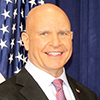
H.R. McMaster is the Fouad and Michelle Ajami Senior Fellow at the Hoover Institution, Stanford University. He is also the Bernard and Susan Liautaud Fellow at the Freeman Spogli Institute and lecturer at Stanford University’s Graduate School of Business. He was the 25th assistant to the president for National Security Affairs. Upon graduation from the United States Military Academy in 1984, McMaster served as a commissioned officer in the United States Army for thirty-four years before retiring as a Lieutenant General in June 2018.







